UBUD, INDONESIA - White smoke rises from five aluminum trays nestled on damp earth as we round a bend hiking toward Ubud’s famous Monkey Forest sanctuary. Men deftly handle equipment that looks like flamethrowers, blasting the trays’ contents with brilliant orange fire. Stacked neatly behind the men are rows of unidentifiable oblong packages, wrapped tightly in white cloth.
My gut grasps what we’ve encountered, but I gently approach a local woman dressed in a fuchsia blouse, sash and batik sarong to confirm.
“See there? Number 59,” says the woman, clutching a tissue and pointing at one of the shrouded parcels. “That’s my grandmother.”
Every five years or so, Hindu villages in Bali such as Padangtegal hold mass cremations to send deceased family members to their next life.
The wealth is held by very few in Indonesia and most villagers are too poor to afford elaborate ceremonies. Instead, the dead are buried until the community can come together to share in the effort and expense of a fitting ritual.
I’m accompanied by a new friend – a traveller from Belgium named Steven – when we unexpectedly amble into this sacred space. We abandon our plans instantly and are welcomed by the mourners to pay our respects as they burn 89 bodies. Steven drops his gaze to the forest floor when he, like me, comprehends we are surrounded by death.
There are no ropes around dozens of muddy graves freshly dug up by families reclaiming corpses from their storage compartments. People mill about the bone yard, taking shade under tall trees with spiralling roots and ignoring the copious monkeys scampering about the pits. The macaques play with empty coconut shells as carefree as children on a playground. I spot a boy, maybe 7 or 8 years old, flickering a small laser pointer about the grounds. He toys with the animals to keep himself occupied amid so many adults.
I walk with careful steps, looking for clues to understand what’s happening, when I am handed a faded information pamphlet. It explains that the purpose of the ceremony, called Ngaben, is to free bodies of all worldly attachments and prepare their souls to unite with a Supreme being before reincarnation. The people fear that if too many bodies lay dormant for too long, they could spawn “bad influences” that might negatively affect the entire village.
“Like a mosaic, in which every piece alone is precious, yet together they make a priceless whole, each individual contributes their part in an effort to create a harmonious spirit,” writes the pamphlet’s author, I Nyoman Suradnya..
We observe a family kneeling over one of the smouldering metal trays. A Brahmin priest has officiated. Now they are gathering the ashes and placing them inside a young coconut. Soon they will join other families in procession and carry their loved one’s ashes to a nearby river. The remains will be thrown in the water for carriage off to sea, and a Pemangku, or village priest, will cut the last ties between the deceased and living.
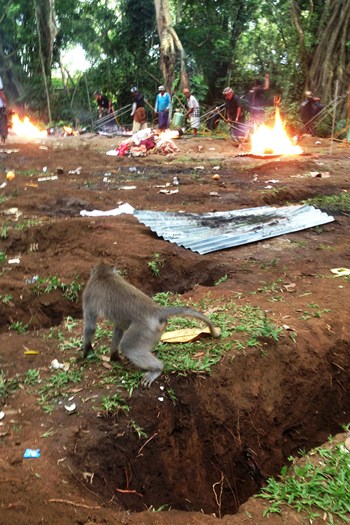
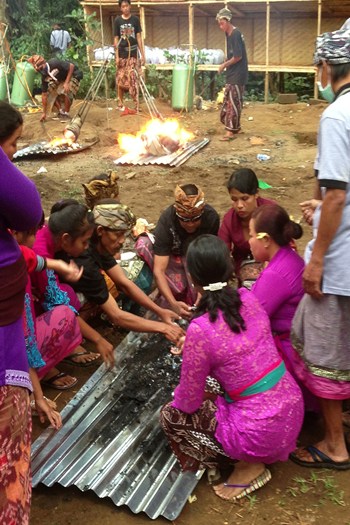
Above: Monkeys play on open graves while relatives collect the ashes of love ones.
“The fact that the entire community works together to create these ceremonies (is) an essential element of their beauty, even though that element is seldom recorded by (a) visitor’s camera, or seen pictured in the glossy tourist images of Bali,” states the pamphlet.
Steven and I exchange few words, simultaneously enchanted and unnerved. We make a small offering and slip away as reverentially as we arrived.
I inadvertently stumble across another scene of mass death hardly a week later, about 1,000 kilometres away in Indonesia’s capital of Jakarta. But now the mood is festive. It is Eid al-Adha, an Islamic holiday commemorating the account of Abraham’s willingness to sacrifice his son to God.
I have just stepped out of a women’s boarding house, where I am being graciously hosted as a “couch surfing” guest, when we spy a heap of freshly slaughtered goats. Scarlet blood seeps from their carcasses into a sewage drain on the road. I am struck by the juxtaposition of twisted limbs and mottled hides near a mother in headscarf and her little boy, casually sitting on a cement wall. A motorbike rests against the curb.
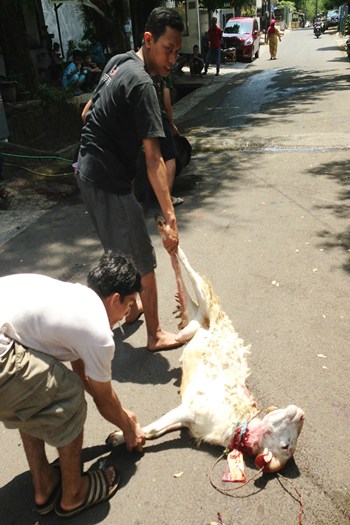
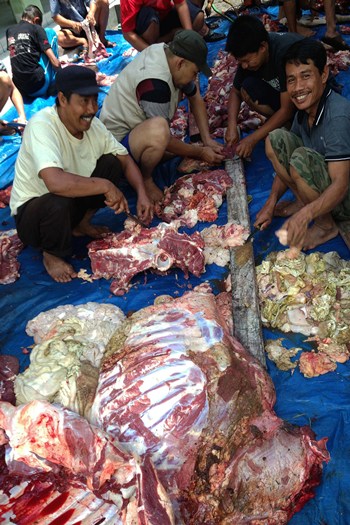
Above: Part of the ceremony involves sacrificing a lamb for a later feast.
I make my approach. Without hesitating, the people usher me into a gated courtyard jammed with squatting men cleaving raw meat on tarps. A woman rushes up to me and offers a tiny cup of sugary tea and an indiscernible deep-fried breakfast. I observe the bustle. A group of men works together stringing up an un-skinned cow by its hindquarters with metal hooks. A man in sporty plastic sandals grins as he hoses off a looping mass of perfectly intact intestines. A row of tiny children show no signs of being phased as they watch the slicing, dicing and rhythmic chop.
I return to Kiki, my local host and a documentary filmmaker. She explains that people buy goats, sheep and cows to be killed and distributed as food to family, friends and, especially, the less fortunate. I am reminded again of the country’s grinding poverty. Meat is not affordable for everyone here. Kiki teaches me the customary words to greet people and convey well wishes: “Selemat hari raya!”
We have only known each other for a couple days, but Kiki invites me to partake in her personal celebrations. She whisks me to a friend’s house where the large family is digging into their own feast.
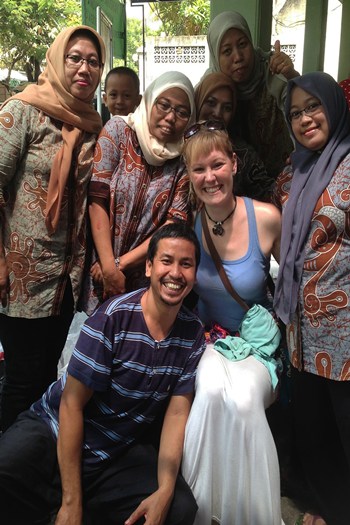
Above: Our writer draws a lot of attention from the locals.
Her friend’s mother dotes on me, swaddling my perspiring body in a traditional Muslim dress. It dawns on me that today happens to be Thanksgiving in Canada. I reflect on my absence from my own mother, father and sister for the past five months as I have backpacked solo around Asia. It is bittersweet to be so far from home, yet cushioned by spirited communities. I revel in the people’s ancient traditions for enduring hardship and death that consequently exalt life.
I call out “Happy Eid!” to this family – who have embraced and adopted me for a day – and savour the serendipity.
About the Author
Tamsyn Burgmann is a career chronicler of other people’s lives. But a twist in the reporter’s plot catapulted her into a whirlwind solo journey through 12 Asian countries over nine months. She rode motorbikes with Muay Thai fighters, ingratiated herself with rebels in Burma and was body painted for a travel exhibition in Manila. Burgmann discovered she had her own story to write. She has since gone diving with sharks off Micronesia’s Palau and gained the trust of a Beirut artist who secretly paints humorous characters on bombed out buildings. She is indebted to folks across the globe who have courageously shared their worlds and, in turn, ignited hers.